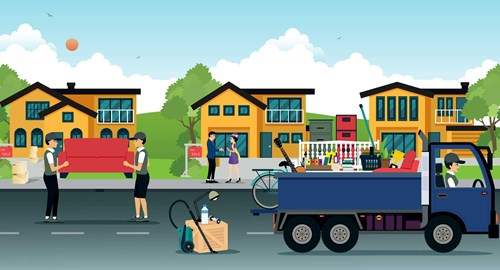Paris and France in Rankings and Numbers
In October 2018, the population of France was estimated to be 67.3 million. Of these, over 2.2 million were living in its capital Paris in the first quarter of the same year, as revealed by INSEE (Institut National de la Statistique et des études économiques), the national statistics bureau of France. France also took the 11th position in HSBC's most recent Expat Explorer Survey, scoring high from respondents in terms of work-life balance and job security, quality of life and culture, healthcare, childcare, and school quality. Notably, the city ranked 19th on the 2018 Global Liveability Index released by The Economist Intelligence Unit, bouncing back from the 32nd place in 2017 due to terrorist incidents the capital suffered in 2015.
There's absolutely no doubt its capital Paris continues to entice visitors and expatriates alike with its history, charm and economic progress. In 2017 alone, the city received 23 million visitors based on hotel stays, with the majority coming from the United States, the UK, Germany, and China. It continues to be the most visited destination in the world in both 2016 and 2017, coming after Bangkok and London. Thanks to its two international airports, Paris-Charles de Gaulle – the second busiest airport in Europe after London Heathrow Airport – and Paris-Orly, plus a good number of regional airports and train stations, those living in France can travel within Europe with ease.
Paris' well-known landmarks, museums, and architecture are only a few of the many reasons why the city keeps attracting visitors from all over the globe. For many of its residents who live in the 20 arrondissements or municipal districts that comprise the capital, living in many of its historic buildings certainly, add to the appeal of life in Paris.
The City of Lights
Paris the city and capital is part of the Paris Region or Île-de-France and is the most populous city in the entire country. The Paris Region itself has an estimated population of nearly 13 million and recorded a GDP of EUR 681 billion in 2016, which represented 31 percent of France's overall GDP.
While Lyon, another major French city, also made the list on the Global Liveability Index in 30th place, Paris remains to be the most populous city in France and has maintained its status as a major hub for finance, commerce, fashion, science and the arts since the 17th century.
The Louvre ranks as one of the most famous museums in the world, receiving over 8 million visitors in 2017. The Eiffel Tower dominates the city's skyline, while the Arc de Triomphe creates an imposing presence on the Champs-Élysées. The front of the Cathedral of Notre Dame de Paris serves as point zero from which all distances are measured.
Aside from being the seat of government, Paris is home to many of the top Fortune 500 companies and plays host to the headquarters of many international organizations including the United Nations Educational, Scientific and Cultural Organization (UNESCO), the Organisation for Economic Co-operation and Development (OECD), the International Chamber of Commerce, the European Space Agency, and the International Federation for Human Rights, among others.
Global City of the Future
As a major stakeholder in the global economy, as well as in politics, education, entertainment, media, and the arts, Paris exerts considerable influence in world affairs. Paris is set to host the 2024 Summer Olympics, which thrusts the city into the spotlight.
In addition, the historic Paris Agreement was drafted at Le Bourget, near Paris during the 2015 United Nations Climate Change Conference, COP 21 or CMP21. The agreement is a global action plan to limit global warming to below 2 degrees Celsius and limiting it to 1.5 degrees Celsius.
As part of its commitment, Paris has set the goal to be carbon-neutral and completely powered by renewable energy by the year 2050. Among its initial efforts are plans to transform school and college campuses into urban oases to the combat the urban heat island effect. This includes repaving surfaces with permeable and heat-sensitive materials, putting up more vegetation including trees, gardens, green walls and green roofs.
Paris also wants to become the start-up capital of Europe and was given the distinction of being named 2017's European Capital of Innovation, winning the first prize worth EUR 1 million. The city is home to Station F, the world's largest start-up campus situated in a former railway depot. Aside from offering aid in the form of financial support, accommodation or other services, the city of Paris will also allow companies to test their prototypes in real-world conditions before launching them.
According to Horizon Magazine, an online publication by the European Union, Paris also boasts an innovation arc, a series of networks spanning the city that offers small workshops called FabLabs, along with co-working spaces and urban farms that allow people to grow vegetables and learn how to minimize food waste.
Expat Living in Paris
According to INSEE, there were around 4.42 million foreigners living in metropolitan France in 2015, with a third hailing from the 28 member states of the European Union, 40% from Africa, and other countries and territories accounting for the rest. Nationals hailing from EU member states, Switzerland, and from the EFTA (European Free Trade) member states of Iceland, Liechtenstein and Norway can live, work and study in France without needing a French visa or permit.
In 2017, France granted long-stay visas or visa de long séjour to 210,223 non-EU nationals, according to the Immigration Department of the Ministry of The Interior (Ministère de l'Intérieur), and over 3.2 million short-stay visas or visa de court séjour. In addition, 92,759 first residence permits were issued for family reasons, 78,758 for students, and 27,556 for employment reasons. Citizens from Algeria, Morocco, China including Hong Kong, and the USA are among the biggest number of applicants for the permits.
In the HSBC Expat Explorer Survey results, France ranks high on the list when it comes to quality of living. Many cited improving their quality of life as the top reason for moving to a new country like France. Indeed, around 56 percent of the 432 respondents in the survey are retirees aged 55 and above who enjoy the rich culture, while 34 percent are between the ages of 35 and 54. The respondents who moved to France for employment are mostly working in the tourism industry and its related sectors such as travel, leisure, hospitality, and customer service. Compared to the global average of USD 99,903, expats in France earn around USD 79,429 or around EUR 71,572.
A majority of the expats who are currently living in France speak French or are learning to better integrate into their local communities, while two-thirds have lived and worked in the country for more than five years. Many of these expats encourage learning the basics of the language prior to moving especially for those who don't speak French at all, to help adjust to the culture better. For professionals in the process of finding a job in Paris, fluency in the language is a definite must.
Life in Paris
: Housing, Healthcare, Education and Transport
The idea of an expat life that includes living in a country with a strong economy where people ostensibly enjoy a 35-hour workweek and where good food is affordable can certainly motivate many ambitious professionals to move to France. However, expats in Paris note that France is one of the countries with a high cost of living, and Paris consistently earns a spot in Mercer's annual Cost of Living Survey as one of the most expensive cities to live in.
Paris is a big city with a big population. With 2.2 million people in the city, this is equivalent to 21,000 persons per square kilometer, which means you're also competing with so many for living spaces. Many apartments in Paris may not be spacious enough for families and don't possess modern conveniences such as heating or cooling.
Finding the right accommodation is one of the most challenging tasks for expats moving to Paris. The city's 20 arrondissements are arranged in a clockwise, spiral shape starting from the city center, and any property closer to the center or a major transport hub will be expensive. Expats should do some preliminary research on the neighborhoods in the 20 arrondissements Paris before doing any negotiation for a rental property.
Are you looking for a place that's family-friendly, with schools nearby and green spaces? The city has plenty of public parks and gardens including the Bois de Vincennes, the Bois de Boulogne, the Parc de la Villette, the Tuileries Garden, and the Parc des Buttes-Chaumont.
How about a more upbeat atmosphere, with plenty of shops, restaurants, and leisure options? Aside from trendy clubs and bars, there are open-air markets, flea markets, bookstores, and a wide variety of cultural events happening on a regular basis in the city. You can visit the website of the Paris City Hall (Mairie de Paris) at https://www.paris.fr/ for a useful guide to Paris as your new home.
Housing may take up a big chunk of your budget but living in Paris means you can also enjoy France's excellent public healthcare system. Considered one of the best in the world, the public healthcare system maintains a high doctor-to-patient ratio and a good number of private and public hospitals available. The country's public health insurance system covers up to 70 percent of healthcare costs and is funded by the government as well as employee contributions. Having a comprehensive international health insurance plan for you and your family allows you to make up for any remaining amount should you require it.
The quality of childcare in France ranks high on the Expat Explorer Survey, hitting the fourth place on the list. Public schools are free for all residents, and if you want your children to learn French at a young age and assimilate better, enrolling them in a public school is the best way to go about it. There are private schools that are state-funded which follow the national curriculum, and those that are privately funded, many of which are Catholic and have religious education included in the curriculum.
You also have the option of having your child attend an international school instead, many of which are in Paris, as well as in the other major cities in France such as Nice and Lyon. You can choose from those that offer a British, American, or German curriculum, or one that follows the International Baccalaureate system. As with most international schools, be prepared to pay high fees.
Paris may be known for its wide boulevards but it's also infamous for its congested roads. For a majority of Parisians, taking public transport is the best way to get around the city, with the Paris Métro as the most popular choice. With 302 stations, this rapid transit system navigates the Paris metropolitan area and travels mostly underground.
Your other options to go in, around and out of Paris are the RER or the Réseau Express Régional, a higher-speed train network that runs above and below ground to the farther suburban regions. Another rail network, the Transilien, helps connect the Paris train and RER stations to other suburban areas. To reach all the other main cities in France as well as travel to Belgium, Italy, Germany, Spain, and Luxembourg, there's the TGV or Train à Grande Vitesse, the country's high-speed rail service and one of the fastest in the world. If you want to visit neighboring England, there's always the Eurostar, another high-speed train network capable of carrying passengers, cars, and buses via a tunnel under the English Channel.








